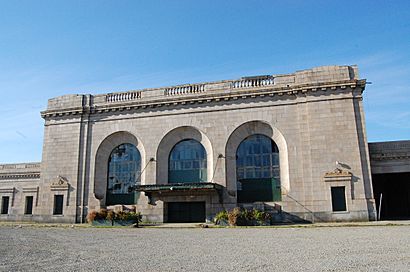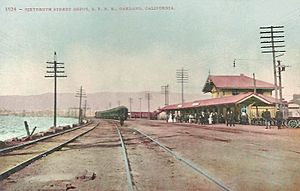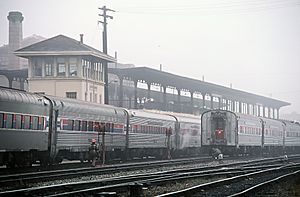16th Street station (Oakland) facts for kids
Quick facts for kids
Oakland
|
||||||||||||||||||||||||||||||||||||||||||||||||||||||||||
|---|---|---|---|---|---|---|---|---|---|---|---|---|---|---|---|---|---|---|---|---|---|---|---|---|---|---|---|---|---|---|---|---|---|---|---|---|---|---|---|---|---|---|---|---|---|---|---|---|---|---|---|---|---|---|---|---|---|---|

Oakland 16th Street Station, main entrance, December 2007
|
||||||||||||||||||||||||||||||||||||||||||||||||||||||||||
| Location | 1601 Wood Street, Oakland, California United States |
|||||||||||||||||||||||||||||||||||||||||||||||||||||||||
| Coordinates | 37°48′56.1″N 122°17′48.3″W / 37.815583°N 122.296750°W | |||||||||||||||||||||||||||||||||||||||||||||||||||||||||
| Owned by | BUILD | |||||||||||||||||||||||||||||||||||||||||||||||||||||||||
| Other information | ||||||||||||||||||||||||||||||||||||||||||||||||||||||||||
| Station code | OAK | |||||||||||||||||||||||||||||||||||||||||||||||||||||||||
| History | ||||||||||||||||||||||||||||||||||||||||||||||||||||||||||
| Opened | 1912 | |||||||||||||||||||||||||||||||||||||||||||||||||||||||||
| Closed | August 21, 1994 | |||||||||||||||||||||||||||||||||||||||||||||||||||||||||
| Former services | ||||||||||||||||||||||||||||||||||||||||||||||||||||||||||
|
||||||||||||||||||||||||||||||||||||||||||||||||||||||||||
|
Invalid designation
|
||||||||||||||||||||||||||||||||||||||||||||||||||||||||||
| Designated: | 1984 | |||||||||||||||||||||||||||||||||||||||||||||||||||||||||
| Reference #: | 81 | |||||||||||||||||||||||||||||||||||||||||||||||||||||||||
The 16th Street station, also known as Oakland Central, was once a very important train station in Oakland, California. It was built by the Southern Pacific Railroad. The station building is a beautiful example of Beaux-Arts architecture, designed by a famous architect named Jarvis Hunt. It first opened in 1912. Trains stopped using this station in 1994.
Contents
History of the Station
Early Days with Southern Pacific
The very first 16th Street station was a smaller wooden building. It was built right on the edge of San Francisco Bay. Over time, the shoreline was filled in, and now the bay is almost a mile away! In 1912, a grand new building replaced the old one. This new station was designed in the Beaux-Arts style by architect Jarvis Hunt.
For many years, the 16th Street station was the main hub for Southern Pacific (SP) trains in Oakland. It became more important than the older 7th Street station. Passengers could also travel from 16th Street to the Oakland Pier. From there, they could take ferries across the bay to San Francisco. After 1958, buses replaced the ferries, taking passengers from 16th Street station to another SP station.
The station also had elevated platforms. These were used for a special commuter train service called the East Bay Electric Lines. This service was later renamed the Interurban Electric Railway (IER) in 1938.
After January 15, 1939, some IER trains from Berkeley stopped using 16th Street. This was because a new railway line opened over the Bay Bridge. The connection to the bridge was north of the station. The IER service ended in July 1941. Some parts of its lines were sold to another company called Key System. However, Key System only used a streetcar line on 16th Street and did not use the elevated platforms.
Some major long-distance trains that used this station included the Oakland Lark (a night train to Los Angeles) and the City of San Francisco (which went all the way to Chicago).
Amtrak and the Station's Closing
The 16th Street station was also a key connection for train travel to places north and east of the Bay Area. Before 1958, people traveling from San Francisco would take ferries to the Oakland Pier. After 1958, they took buses to 16th Street.
In 1971, a new company called Amtrak took over most long-distance passenger train services. Amtrak decided to make Oakland its main hub for the Bay Area. This meant San Francisco, a very large city, no longer had direct long-distance train service.
The 16th Street station was badly damaged during the 1989 Loma Prieta earthquake. Even so, trains continued to use a nearby building. Some trains, like the Capitols and San Joaquins, moved to the new Emeryville station on August 13, 1993. However, longer-distance trains still used Oakland Central while work was finished at Emeryville. The Coast Starlight and California Zephyr trains started stopping at Emeryville on August 5, 1994. They made their last stops at Oakland 16th Street on August 21, 1994.
After this, Emeryville became the only Amtrak stop in the Oakland area. That changed when the new Oakland–Jack London Square station opened on May 22, 1995.
Emeryville mostly replaced 16th Street station as the place where passengers could connect to Amtrak Thruway Motorcoach buses to San Francisco. This was for people heading north to Seattle or east to Chicago, or those arriving from the north and east. Emeryville is closer to the San Francisco–Oakland Bay Bridge than the Oakland–Jack London Square station. However, Jack London Square station is now the San Francisco connection for the Coast Starlight train for southbound passengers from San Francisco and northbound passengers going to San Francisco.
In the mid-1990s, the train tracks next to the station were moved further west. This happened during the building of Interstate 880. This highway replaced a part that was destroyed in the earthquake. Moving the tracks left the station building isolated from the trains.
Today, the station buildings are still mostly in good condition. This includes the old control tower and the elevated platforms. In 2005, a company called BUILD bought the station. They are working to restore it as part of a local project. In 2015, an opera company even used the station for a show called Lulu. As of 2021, the station is rented out for private events.
In Media
The 16th Street station has been used as a filming location for several movies and music videos.
- Chu Chu and the Philly Flash
- Funny Lady (it was used to look like the Cleveland station)
- RENT
- Hemingway & Gellhorn (it stood in for the Hotel Florida)
- The band Mumford & Sons filmed their music video for "Babel" at the station.
 | Ernest Everett Just |
 | Mary Jackson |
 | Emmett Chappelle |
 | Marie Maynard Daly |



